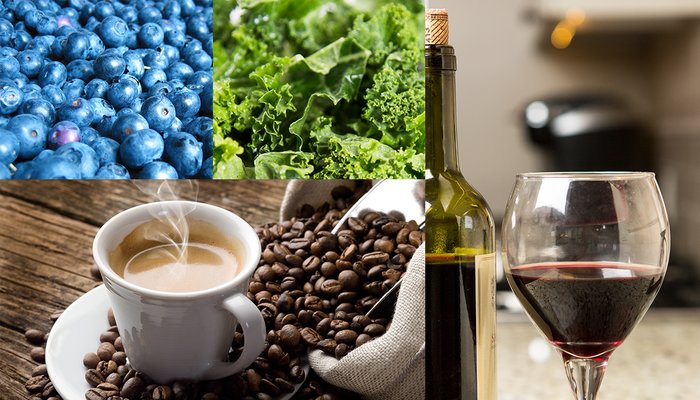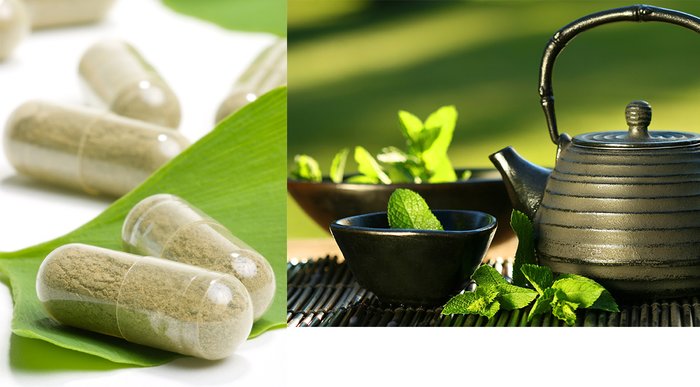Polyphenols have been all over the news in recent years, but what the heck are they, and how can you use them to help you reach your goals?
Found in coffee, green tea, dark berries, cocoa powder, leafy greens, and even some spices, polyphenols are credited with anti-inflammatory and antioxidative properties.
Hence their presence in a variety of recovery-enhancing and fat-burning supplements.
What Are Polyphenols?
Polyphenols are a class of compounds which occur naturally in a variety of the foods we consume. Polyphenols are grouped into subclasses based on their chemical composition.
Some subclasses of polyphenols you may have heard of before. Quercetin is a member of the flavonoid family, while stilbenes include compounds such as resveratrol, the heart-healthy compound in red wine.[1]

When it comes to exercise performance, the primary role of polyphenols is to act as an antioxidant. Exercise causes damage to muscle cells, releasing destructive free radicals into the circulatory system.[2] Left unchecked, these highly reactive molecules can wreak havoc on cells and various bodily processes.
Antioxidant polyphenols neutralize free radicals by converting them into more stable molecules. Therefore, if you supplement with these powerful compounds, you can reduce oxidative damage from free radicals, decreasing overall damage and promoting faster recovery.[3]
Balancing Damage and Recovery
Exercised muscles experience two distinct—but related—waves of damage. Primary damage occurs as a direct result of the stress placed on the muscle fibers by loaded movement, also known as resistance exercise.
Following this damage, the muscle fibers release chemicals called free radicals, which can cause further damage to surrounding cells, even if those cells didn't experience primary damage. This is known as secondary damage.

At first glance, secondary damage may sound bad. Yet there can't be adaptation without a stressor. Therefore, the goal in building strength, size, and performance isn't to minimize damage, but to optimize the balance between damage and recovery.
Previous research demonstrates supplementation with certain types of polyphenols may improve total antioxidant capacity, enhancing the body's ability to tolerate increased oxidative stress. While this doesn't necessarily translate to improved performance, it does affect the pace and quality of recovery.[4]
If you undergo a particularly intense competitive period, and are not able to completely rest and recover, supplementing with polyphenols may minimize inflammation and allow your body to prepare for your next competition or intense bout of exercise.[5]
Think of supplementation with polyphenols as similar to the use of ice baths—when used correctly in the short term, they may help you from getting too beat up so you're always ready to compete.
Polyphenols and Body Composition
One area of study which seems to show the most promise in supplementation with polyphenols is in improved body composition. Most studies evaluating the efficacy of polyphenol supplementation have focused on the use of a specific subtype of the flavonoids called catechins.
Catechins are primarily found in teas, cocoa, and darkly colored fruits, such as blackberries, cherries, and raspberries. Certain types of catechins, such as epigallocatechin-3-gallate (EGCG), are the active compounds in green tea extract, a popular supplement.

The primary function of catechins in the body is to inhibit the enzyme catechol-O-methyltransferase, which is partially responsible for the breakdown of norepinephrine. Norepinephrine is highly involved in the mobilization of fat stores. Therefore, if norepinephrine is preserved, you can make more energy from fat stores to power your body as it exercises.
To make the most of this boost, take EGCG before your workout. Exercise-induced increases in norepinephrine help to amplify the response to EGCG and increase actual utilization of fat, rather than just increasing mobilization.
Put more simply, liberated fat stores are locked and loaded following supplementation with EGCG, but they need to be used or they will just be stored again. Hence the importance of exercise.
How Much Should You Consume?
Even 90 milligrams of EGCG ingested simultaneously with small amounts of caffeine (50 milligrams) significantly increases energy expenditure compared to a catechin-free beverage.[6] Furthermore, EGCG has been shown to increase rates of fat oxidation independent of caffeine intake.[7]
So if you are looking to enhance recovery—without the painful freeze of an ice bath—and increase fat loss to improve your physique, try adding some polyphenol supplementation into your routine!
References
- Myburgh, K. H. (2014). Polyphenol supplementation: benefits for exercise performance or oxidative stress? Sports Medicine, 44(1), 57-70.
- Powers, S. K., & Jackson, M. J. (2008). Exercise-induced oxidative stress: cellular mechanisms and impact on muscle force production. Physiological Reviews, 88(4), 1243-1276.
- Sumners, D. P., Dyer, A., Fox, P., Mileva, K. N., & Bowtell, J. (2011). Montmorency cherry juice reduces muscle damage caused by intensive strength exercise.
- Goldfarb, A. H., Garten, R. S., Cho, C., Chee, P. D., & Chambers, L. A. (2011). Effects of a fruit/berry/vegetable supplement on muscle function and oxidative stress. Medicine & Science in Sports & Exercise, 43(3), 501-508.
- Cobley, J. N., McGlory, C., Morton, J. P., & Close, G. L. (2011). N-Acetylcysteine’s attenuation of fatigue after repeated bouts of intermittent exercise: practical implications for tournament situations. International Journal of Sport Nutrition and Exercise Metabolism, 21(6), 451-461.
- Dulloo, A. G., Duret, C., Rohrer, D., Girardier, L., Mensi, N., Fathi, M., ... & Vandermander, J. (1999). Efficacy of a green tea extract rich in catechin polyphenols and caffeine in increasing 24-h energy expenditure and fat oxidation in humans. The American Journal of Clinical Nutrition, 70(6), 1040-1045.
- Roberts, J. D., Roberts, M. G., Tarpey, M. D., Weekes, J. C., & Thomas, C. H. (2015). The effect of a decaffeinated green tea extract formula on fat oxidation, body composition and exercise performance. Journal of the International Society of Sports Nutrition, 12(1), 1

